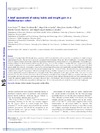Please use this identifier to cite or link to this item:
https://accedacris.ulpgc.es/jspui/handle/10553/24248
| Title: | A brief assessment of eating habits and weight gain in a Mediterranean cohort | Authors: | Zazpe, I. Bes-Rastrollo, Maira Ruiz-Canela, Miguel Sánchez-Villegas, Almudena Serrano-Martínez, M. Martínez-González, Miguel Ángel |
UNESCO Clasification: | 3206 Ciencias de la nutrición 32 Ciencias médicas |
Keywords: | Obesity Cohort studies Prospective studies FFQ |
Issue Date: | 2011 | Project: | Red Alimentación Saludable en la Prevención Primaria de Enfermedades Crónicas: la Red Predimed. (Retics 2006) | Journal: | British Journal of Nutrition | Abstract: | Assessment of eating habits (EH) through closed questions could be an alternative tool to assess diet as a predictor of weight change in epidemiological studies. The aim was to assess the association between baseline EH and the risk of weight gain or becoming overweight/obese in a Spanish dynamic prospective cohort (the Seguimiento Universidad de Navarra Project) of 10 509 participants. The baseline questionnaire included ten short questions with two possible answers: yes or no. We calculated a baseline EH score, categorised in quartiles, positively weighting answers on more fruit, vegetables, fish and fibre and less meat, sweets and pastries, fat, butter, fatty meats and added sugar in drinks. Reducing the consumption of meat or fat and removing fat from meat were significantly associated with lower weight gain. The partial correlation coefficient between EH score and weight change was - 0·033 (P = 0·001). We observed 1063 cases of incident overweight/obesity among 7217 participants without overweight/obesity at baseline. Trying to eat more fruit, fish or fibre and less meat was inversely significantly associated with incident overweight/obesity. Those participants in the upper quartile of the score were at a 38 % (adjusted OR 0·62; 95 % CI 0·48, 0·81) lower risk of developing overweight/obesity during the follow-up compared with those in the lower quartile. However, the receiver-operating characteristic curves for the model with and without the EH score were materially identical. Despite the apparent significant inverse association, this score had a low predictive value for future weight gain and for incident overweight/obesity in a Mediterranean population, although some EH were independently and positively associated with weight gain. | URI: | https://accedacris.ulpgc.es/handle/10553/24248 | ISSN: | 0007-1145 | DOI: | 10.1017/S0007114510004149 | Source: | British Journal of Nutrition [ISSN 0007-1145], v. 105 (5), p. 765-775 | Rights: | by-nc-nd |
| Appears in Collections: | Artículos |
SCOPUSTM
Citations
16
checked on Jun 8, 2025
WEB OF SCIENCETM
Citations
15
checked on Feb 15, 2026
Page view(s) 5
288
checked on Jan 15, 2026
Download(s)
197
checked on Jan 15, 2026
Google ScholarTM
Check
Altmetric
Share
Export metadata
Items in accedaCRIS are protected by copyright, with all rights reserved, unless otherwise indicated.
